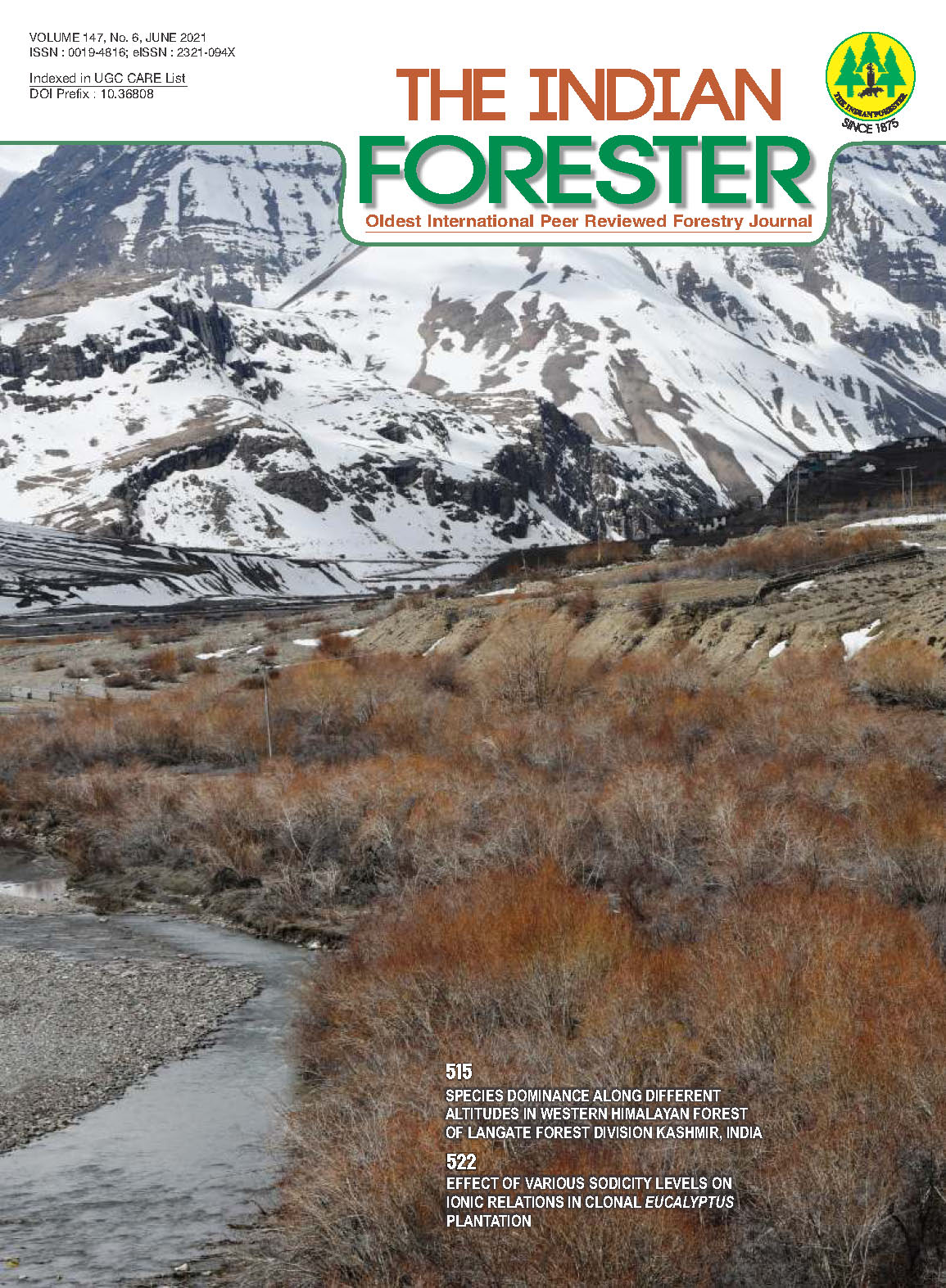Performance of Organic Manures on Growth and Yield of Tomato (Lycopersicon esculentum L.) Under Jatropha Based Alley Cropping System
DOI:
https://doi.org/10.36808/if/2021/v147i6/151339Keywords:
Tomato, Alley Cropping System, FYM, , Neem Cake and Vermicompost.Abstract
Field experiment was conducted to investigate the effect of different organic manures (FYM + Neem cake + Vermicompost) application on growth and yield of tomato (Lycopersicon esculentum L.) under Jatropha based alley cropping system at the forest nursery, School of Forestry and Environment, Sam Higginbottom Institute of Agriculture, Technology and Sciences, Allahabad (U.P.) India. Total of eight treatments including control were replicated three times. The data recording on plant height, number of branches and number of leaves per plant, number of fruit per plant, fruit weight, fruit diameter, fruit yield per plant at different interval 30 days, 60 days, 90 days and 120 days to evaluate the performance of different combination of organic manures on growth and yield of tomato were found to be maximum in T7 [FYM + Neem cake +Vermicompost] followed by T5 [FYM + Vermicompost], T4 [Fym + Neem cake], T6 [Neem + Vermicompost], T3 [Vermicompost] and minimum in T0 (Control) under the jatropha based alley cropping system. Therefore FYM + Neem cake +Vermicompost can be best combination of jatropha trees if tomato is to be planted. Moreover compared to open field cultivation of tomato crops in growth and yield slightly decreased under the jatropha based alley cropping system. This was due to the allelopathic effect of jatropha on tomato. Although growth and yield slightly decreased however tomato cultivation under jatropha based alley cropping system profited by providing biodiesel and tomato crop at the same time period. Ultimately this will help in reaching goals of sustainable agriculture.References
Adekiya A.O. and Agbede T.M. (2009). Growth and yield of tomato (Lycopersicon esculentum Mill) as influenced by poultry manure and NPK fertilizer. J. Food Agric. 21(1): 10-20.
Anon. (2005). Annual Report. Directorate of horticulture, Raipur (C.G.)
Bagal S.D., Sheikh G.A. and Adsule R.N. (1989). Influence of different levels of N, P and K fertilizers on the yield and quality of tomato. J. Maharashtra Agric. Univ., 14: 158-160.
Becker K. and Francis G. (2003). Bio-diesel from Jatropha plantations on degraded land. August 2009 http://www.unihohenheim.de/~www480/docs/publish/jatrophaondegrade d_land.pdf
Blauser M.A. (2002). Alley Cropping: An Agroforestry Practice. University of Minnesota Extension Service. www.extension.umn.edu/distribution/naturalresources/component/DD7407b.html/downloaded.
Goldmansachs (2007). Effect of shading with aluminised screens on fruit production and quality in tomato (Solanum lycopersicum L.) under greenhouse condition. Spanish Journal of Agriculture Research, 1: 695-971
Grimm C. (1996). The Jatropha project in Nicaragua. Bagani Tulu (Mali) 1: 10–14.
Hanson P., Chen J.T., Cou C.G., Morris R. and Opena R.T. (2001). Tomato production, Asian Vegetable Research Development Center.
Haque M.S., Islam M.T. and Rahman M. (1999). Studies on the presentation of semi-concentrated tomato juice. Bangladesh J Agril Sci., 26(1): 37-43.
Heller J. (1996). Physic nut (Jatropha curcas L.). Promoting the conservation and use of underutilized and neglected crop. 1. Institute of Plant Genetics and Crop Plant Research, Gatersleben/Intl. Plant Genetic Resources Inst., Rome.
Kang B.T. and Gutteridge R.C. (1994). Forage Tree Legumes in Alley Cropping Systems.CAB International, Wallinford, Oxon, UK. ISBN 0958567719.
Lal G. and Dayal H. (2014). Effect of integrated nutrient management on yield and quality of acid lime (Citrus aurantifolia Swingle). African J. Agric. Res. 9(40): 2985-2991.
Nair P.K.R. (1993). An Introduction to Agroforestry.Dordrecht. Kluwer Academic Publishers. The Netherlands. First edition. Pp139.
Parry B.A., Ganai A.M. and Fazili K.M. (2007). Physiochemical parameters, growth and yield of tomato: role of farm yard manure and Neem cake. American- Eurasian Journal of agriculture and environmental Sciences, 2(3): 303-307.
Rajya L.P., Saravanan S. and Lakshman M.N. (2015). Effect of organic manures and inorganic fertilizers on plant growth, yield, fruit quality and shelf life of tomato. C.V. Pkm-1. 5(2): 7-12.
Rashid M. (1999). Sabji Biggan (in Bengali), Rashid Publishing House, 94, Old DOHS .Dhaka, p526.
Renuka B. and Ravishankar C. (2001). Effect of organic manures on growth and yield of tomato. South Indian Hort. 49: 216-20.
Rockefeller Foundaysion. (1998). The potential of Jatropha curcas in rural development and environment protection-An exploration. Concept paper. Rockerfeller Foundaysion and Scientific & Industrial Research & Development Centre, Harare, Zimbabwe.
Salunkhe D. K., Desai B. B. and Bhat N. R. (1987). Vegetables and Flower Seed Production. 1st. Edn., Agricola Publishing Academy., New Delhi, India. 118-119.
Yeptho K.A., Singh A.K., Kanaujia S.P. and Singh V.B. (2012). Quality production of kharif onion (Allium cepa) in response to bio-fertilizers inoculated organic manures. Indian J. Agril. Sci., 82 (3): 236-240.
Downloads
Downloads
Published
How to Cite
Issue
Section
License
Unless otherwise stated, copyright or similar rights in all materials presented on the site, including graphical images, are owned by Indian Forester.





